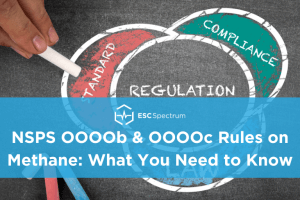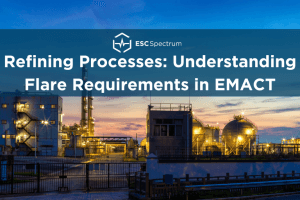Fall User Group & Training Abstracts
Monday, November 14, 2022: Training
Modbus 101 – Beginner to Intermediate Configuration
TBD
CEMS 101 Workshop
What is CEMS? Part 1 – 8:00 am – 9:00 am
This presentation will dive into the types of CEM systems from stack to server. How does it work? What does it take to obtain gas samples from a stack or duct and convert them to an accurate reading that we can report to the EPA? We will discuss basic CEMS system design and theory and the end result – valid data!
What is CEMS? Part 2 – 9:00 am – 10:00 am
In this breakout session, we will discuss the pieces and parts that make up a CEMS System, including the CEMS shelter, stack or duct probe, umbilical, heating and cooling systems, plant air system, sample conditioning system, the analyzer rack and analyzers, Data Controllers, and the Data Acquisition and Handling System Server.
CEMS Dilution Probe M&C SP2006 – 10:30 am – 12:00 pm
How do we obtain a gas sample from a stack or duct? It requires lots of suction! In this session, we will go over the various types of probes that are designed to efficiently take a gas sample from a stack or duct, large or small, diluted or extractive. We’ll discuss the M&C SP2006 Sample Probe and other similar probes, including maintenance and general troubleshooting.
CEMS Calibration & Linearity – 1:00 pm – 3:00 pm
What does the EPA expect from us? Valid Data! Join us in this presentation as we discuss the rules and regulations and how they apply to CEMS and the equipment as well as testing and maintenance requirements. We’ll discuss Gas Analyzer Daily Calibrations, Quarterly CGA’s/Linearity Testing, & Annual RATA’s. By the end, you’ll know how to record the best Online Valid Data possible.
CEMS DAHS & Data Logger – 3:30 pm – 5:00 pm
The Data Logger/Controller is a technician’s best friend! This presentation discusses the function of the Data Logger/Controller such as the ESC Spectrum 8864. We’ll review why it’s needed and how it works with the DAHS (Data Acquisition Handling System) for us to stay in compliance with the EPA’s rules and regulations. Lastly, we will make PDFs to send to the EPA with your choice of software: StackVision or Prism.
StackVision 101
StackVision 101 is an introductory level series of topics to give that participant an overview of features and benefits in using the StackVision software to manage your CEMS. Topics covered include:
- CEMScape- a graphical representation of the CEMS configuration
- CalLab and Cylinder Management- historical calibration data and tools to manage daily, quarterly, weekly, and other required calibrations and validations
- Entering Quality Assurance (QA) data records
- Creating linked reports using SQL Reporting Services
- Active Alarms-acknowledging alarms and understanding what causes alarms
- Using the interactive electronic logbook feature
- Using Consoles and Dashboard to see real-time data and system status
Tuesday, November 15, 2022: User Group
Welcome to the Fall 2022 User Group
We’re glad to see you in Austin, TX for the User Group. ESC Spectrum President, Jeff Rabensteine, and User Group Steering Committee Chair, Drew Blankenship, will cover some basic information before jumping to our Keynote Speaker and sessions.
Keynote Speaker: Stewart Mann
Stewart Mann, frontman for soulful swamp rockers The Statesboro Revue, and founder and CEO of Wild Rooster Events will talk about leadership, team building, and how to inspire yourself and your colleagues to reach their potential.
ESC Spectrum Update
Learn more about the latest projects and developments at ESC Spectrum and get information on our path forward. In this session, we will provide updates on software and hardware products, industry regulations, customer support, and engineering projects.
Open Discussion: Q&A with ESC Spectrum
Participate in an open-floor, interactive session to discuss any topics of interest with ESC Spectrum. In order for us to continually improve to better meet your needs, we encourage you to ask questions during this time.
Getting the Most Out of Support – Community & Help Desk – Michael Johnson & Harvey Fierro
Join Michael and Harvey as they walk you through getting the most out of what the Support team offers, including our remote access options.
User Group Member Meeting & Voting on New Bylaws – Steering Committee Members
User Group Steering Committee Chair Drew Blankenship will lead this meeting, wherein member companies will vote on updating bylaws. In May, the Committee proposed a rewrite of User Group bylaws. Please remember that only one representative from each company can vote.
Customer Presentation: Customizing Your StackVision Dashboards – Bert Campbell
In this presentation, Production Specialist for DAS Software and Hardware Support Bert Campbell will explain how Luminant Power, a subsidiary of Vistra Corporation, has adapted their StackVision Dashboards to best suit their daily operations. He will demonstrate how these improvements resulted in increased operational efficiency, interdepartmental communication and faster troubleshooting.
Customer Presentation: Solving QA Task Tracking Across a Fleet with QAInsight Software – Tony Catanese
Tony Catanese, Air Emissions Monitoring Consultant for Dominion Energy, will present how the company uses QAInsight for Quality Assurance (QA) test scheduling, planning, and tracking.
How to Prepare for a Field Audit – Jon Konings
During this presentation, Jon will explain what issues a facility might encounter during a field audit. Jon will share his experiences in field audits as a utility employee, focusing on the field audit checklists that the Clean Air Market Division (CAMD) has prepared for their auditors to help prepare you for future audits.
ECMPS 2.0 Developments – Chris Worely & Charlie Frushour
In this session, EPA Environmental Policy Analyst Chris Worley will present the latest information about the Emissions Collection and Monitoring Plan System (ECMPS) software re-engineering project. He will review what to expect in the coming months, how it will affect you, and answer your questions.
Part 75 Q&A With the EPA – Chris Worley & Charlie Frushour
EPA Environmental Engineer Charlie Frushour talks about new developments in Federal Part 75 regulations that may impact you, as well as answer your regulatory questions. He will provide an update on the Part 75 Audit desk initiative and draft rule package, as well as the various ad hoc checks running outside of ECMPS.
Wednesday, November 16, 2022: User Group Track Sessions
Environmental Track
Transitioning from LME to CEMs – What are the Steps? – Jon Konings
Join Jon in this presentation as he breaks down the steps necessary to install Appendix D-type CEM systems when transitioning away from using the LME (Low Mass Emitter) reporting protocol. We will walk you through the steps necessary to procure, install, certify, and begin operating an Appendix D CEM system in lieu of reporting under your existing LME reporting protocols.
Managing your DAS Server: Best Practices and Disaster Recovery Preparedness – Daniel Frome
Your server’s health and preparedness for disaster can go a long way to resting more comfortably at night. Avoid those sleepless nights of questioning: Am I backing up everything I need to recreate my new DAS? How much time will it take? Where are my backups? Are my backups good? Not only will this presentation cover disaster recovery plans, but it’ll touch on best practices when setting up your server depending on your environment (Physical/Virtual Split/Shared): page file size, database memory, database compression, memory allocation, power configuration, etc. Join Daniel and leave knowing you have a plan to avoid sleepless nights.
Best Practices for Developing or Updating Your QAQC Plans – Susan Kennedy
QAQC plans lay out your plant’s compliance plans as required by your operating permit and the various air quality regulations impacting your facility. Join Susan in learning about today’s changing operating environment, and how these plans should be reviewed on a regulatory basis and updated to reflect how your facility operates and manages your CEM systems.
Main Prism Tools and Their Functionality – Ly Poe
In this presentation, our System Support Engineer, Ly Poe, will take you through how to take full advantage of the Prism Data Editor, Bottle Manager, and other core tools for Prism users.
Step-by-Step Instruction for Using the New Prism 1.6 Software Installer – Michael Johnson
In this course, you will learn how to use the new Prism installer that will be used for Prism 1.6 and beyond. Join Michael Johnson as he goes step by step through the process of installing the Prism software.
Common Prism Errors & Their Resolution – Michael Johnson
Our System Support Engineers field questions about our Prism DAS software on a regular basis. In this presentation, we will discuss common prism challenges and how our excellent customer support team addresses them.
Common StackVision Errors & Their Resolution – Ismael Tapia and Quinn Lesar
Join Ismael and Quinn, two of our System Support Engineers, have years of expertise working with various DAS-related issues. Specifically, we will discuss common StackVision challenges and errors our customers face.
CEMS Technician Track
CEMS Recertification and Certification Events – Greg Owen
What is Valid Data? How do we validate the data from our CEMS System? This presentation dives into a short review of the Initial Certification and Recertification of gas analyzers. We will discuss periodic testing such as daily calibrations, quarterly CGA’s/linearities, & annual RATAs. We will cover CFR40 Part 75, Section 12 and discuss requirements to maintain Valid CEMS Data even after making CEMS equipment changes or completing repairs. You’ll leave knowing how to record the best online valid data possible.
Getting the Most of the 8864 Data Controller – Anthony Dougherty
Your server’s health and preparedness for disaster can go a long way to resting more comfortably at night. Avoid those sleepless nights of questioning: Am I backing up everything I need to recreate my new DAS? How much time will it take? Where are my backups? Are my backups good? Not only will this presentation cover disaster recovery plans, but it’ll touch on best practices when setting up your server depending on your environment (Physical/Virtual Split/Shared): page file size, database memory, database compression, memory allocation, power configuration, etc. Join Daniel and leave knowing you have a plan to avoid sleepless nights.
A Step-by-Step Guide to 8864 Data Controller Firmware Upgrades & Functionality Review – Alex Fuentez
We all know how challenging it can be to upgrade major systems such as the 8864 Data Controller. Join Alex as he walks through the process and procedures of carrying out and finishing a firmware upgrade on the 8864.
ModBus Troubleshooting for Beginners – Simón Arends
The 8864 Data Controller has a few tools to help users diagnose Modbus communication issues. This breakout session will discuss these diagnostic tools and their applications. This breakout session is beneficial for users with at least a basic understanding of Modbus communication and its implementation within the data controller.
StackVision Dashboard Design: Tips and Tricks – Steve Glanovsky
StackVision 7.1 introduces multiple enhancements to dashboard functionality and design options. This presentation will review the new dashboard features introduced over the past few StackVision releases as well as the most recent dashboard update in the StackVision 7.1 release.
What’s In my Monitoring Plans? – Jon Konings and Susan Kennedy
Dive into this presentation with Jon and Susan as they discuss how important it is to review and update your electronic Monitoring Plan records to make sure they accurately reflect the configuration of CEM systems, pollution controls being used, and the current operating strategies at your plant. Your type of plant equipment will determine your Monitoring Plan and will impact the way the units are operated or dispatched, and the potential monitoring systems which can be used. These plans are one of the first items to be reviewed during an audit, so they need to accurately reflect how the plant is operated.
Prism and the 8864 Data Controller – Douglas Novy
Recently ESC Spectrum had several advances toward integration of the 8864 with Prism. These new features allow Prism to seamlessly communicate with the 8864 and provide user interfaces with which to fully configure the 8864 Data Controller. This presentation will discuss those new Prism+8864 features as well as provide some technical background on how the Prism/8864 communication and configuration work.
StackVision Track
DataLab and DataLab Viewer – Mark Astudillo
Learn more about the benefits and features of the DataLab tool regarding managing CEMS data. This course will discuss using advanced data reviewing tools such as filters, summaries, and colors to highlight data anomalies and status. Mark will also cover creating, saving, and recalling customized displays in views for quick access and drilling down data to see varying data intervals.
CalLab & New Cylinder Management Tool – Mark Astudillo
Join us for a deeper look into the role of CalLab and the Cylinder Management tools. Learn more about using CalLab to manage historical calibration data and using Cylinder Management to manage calibration gas cylinders. There will also be a review of associated calibration reports.
Entering Linearity and RATA into StackVision – Mark Astudillo
It’s important to understand the ins and outs of quarterly and annual QA tests, including what they are and the requirements for each. Mark will also elaborate on understanding the use of StackVision to record and store quarterly and annual QA test data.
Creating Linked Reports in StackVision – Mark Astudillo
We will walk through the steps of accessing and using the SQL Reporting services to create linked reports as well as how to schedule report generation. These will be the standard StackVision reports with the required default settings.
Working with Active Alarms – Mark Astudillo
This session will discuss using the Alarm System Design reports to review alarm settings and causes in StackVision. We will also address understanding the differences in the three alarm types, acknowledging and clearing active alarms, and reviewing the available alarm history reports.
Using the 8864 Data Controller Tools – Mark Astudillo
Mark will review the purpose and functionality of the Data Controller tools to remotely access and control the 8864 data controller. This will include various ways to access the Data Controller tool, using the tool to retrieve data not yet polled, and initializing calibrations remotely from StackVision.
Using the Logbook and Logbook settings – Mark Astudillo
This session will cover how to access and use the Logbook feature. We will also elaborate on understanding automatic logbook entries, filtering historical logbook entries, and reviewing previous logbook entries.
CEMS 101 Track
CEMS For Beginners – Bobbi Jean Greenwalt
New to CEMS? Whether you’re a technician new to CEMS or you have been reporting CEMS data and want to know more about how the equipment works – this class is for you. This presentation provides a high-level overview of CEMS and their components. We’ll start with the basic layout of a CEMS and how it interfaces with a DAS. Then we’ll dive into the basic function of full-strength extractive and dilution-extractive CEMS. Finally, we’ll discuss the principles of opacity and flow monitors. Bring your questions!
How Do I Evaluate My CEMS? – Bobbi Jean Greenwalt
This presentation dives into how to evaluate your CEMS for on-going reliable operation. We’ll discuss the life expectancy of equipment and equipment obsolescence along with a methodology to determine if your equipment is facing either obstacle as well as discuss the role your QAQC plan plays in maintaining a reliable CEMS.
I’m Ready to Upgrade My CEMS: Now What? – Bobbi Jean Greenwalt
Upgrading your CEMS can be a challenging task. This presentation will walk you through your upgrade options from retrofits to full CEMS replacements along with design options and considerations. We’ll also discuss the planning process from developing the project scope through certification.
Common CEMS Maintenance Activities – John Cutaia
Want to make your life easier as a CEMS Technician? Want to know how to obtain High Percentages of Valid Data? Performing good Periodic Maintenance in order to get the highest Data Valid Percentages as possible. We will discuss common probes, analyzers, and Sample System Maintenance Activities
CEMS Troubleshooting Techniques: Probe, Analyzer or Other Equipment – Greg Owen
Join Greg as he reviews tips and tricks for troubleshooting CEMS and getting the highest valid data percentages we can. He will share the latest techniques and issues with CEMS on the newest probes, analyzers, and sampling systems. There will be quite a few new things to share so be sure to check it out!
Thermo Hg Equipment Overview – John Cutaia
During this presentation, John will discuss the Thermo Scientific Mercury Freedom System including the layout, design, and Theory of the Thermo Hg System including the probe, umbilical, analyzer, calibrator, and sampling system. We’ll also dive into the recommended Support Equipment and Maintenance.
A Guide to Thermo Fisher Hg QA/QC Activities – John Cutaia
TBD
Thursday, November 17, 2022: Training
Modbus 101 – Beginner to Intermediate Configuration – Yasmin Alkusari
TBD
StackVision 201 Intermediate Training – Mark Astudillo
StackVision 201 is a class targeted to the intermediate user. The topics contained in this session are more of the action steps in using StackVision to manage CEMS data. Topics include:
- Using CEMScape to understand relationships in the parameters used in collecting CEMS data
- Creating customized displays called views in the corresponding feature areas using filters and summaries
- Using the Controller Tools feature to interact remotely with the 8864 data controller
- 8864 data controller system settings
- Using StackVision to record and store data records
- Reviewing and entering Quality Assurance data
- Using the Configuration Compare tool to verify settings in the 8864 Data Controller and the StackStudio file are the same
Thermo Fisher Analyzer Family (NOx/SO2/CO2) Training & Teledyne Analyzer Family (NOx/SO2/CO2) Training
NOx Analyzer Training 8:00 am – 10:00 am
Thermo 42iQ and 42iQ-LS NOx Presenter: John Cutaia
Teledyne T200M NOx Presenter: Greg Owen
Pick your flavor: Thermo or Teledyne NOx Analyzers. We will discuss all aspects of a Chemiluminescent NOx Analyzer such as the Theory of Operation and Instrument Layout. We’ll dive into all the pieces & parts including the sample flow routing, reaction chambers, converters, photomultiplier tubes, and more! This presentation will also talk about common issues, solutions, and maintenance. Join us for tips on how to make your analyzer run smoothly!
SO2 Analyzer Training 10:30 am – 12:00 pm
Thermo 43iQ SO2 Presenter: John Cutaia
Teledyne T100 SO2 Presenter: Greg Owen
For those who still have an SO2 Analyzer, join us as we will discuss the Theory and Function of a Pulsed Florescence SO2 Analyzer. We will cover the operation, function, and design of the newest Thermo and Teledyne Touch Screen Software Interfaces and Menus. This presentation will touch on common issues and solutions as well as Maintenance Recommendations.
CO2 Analyzer Training 1:00 pm -3:00 pm
Thermo 410iQ CO2 Presenter: John Cutaia
Teledyne T360 CO2 Presenter: Greg Owen
We will be showing and discussing the robust CO2 Analyzers from Thermo and Teledyne. We’ll cover topics such as the Theory of Operation, explaining the internal parts, and sample gas flow. Plus, how to use the menus to perform a good “Bench” Calibration, and use the tools included in the newer Software to get the best performance out of your analyzers. Join us for a bonus discussion on how to use a CO2 analyzer to properly tune your Dilution Probes.
CO Analyzer Training 3:30 pm -5:00 pm
Thermo 48iQ CO Presenter: John Cutaia
Teledyne T300 CO Presenter: Greg Owen
You don’t want to miss this class if you have a CO Analyzer to maintain. We will discuss the Theory and Operation of a CO Analyzer: the good, the bad, and the ugly. Come join us for discussion on how to make the best of your CO Analyzer. This training will cover the General Theory and Operation, the internal components, as well as some advanced techniques to make your analyzer perform the very best it can.
Vendor Partners Joining Us at Fall User Group & Training
From The Source Blog

NSPS OOOOb & OOOOc Rules on Methane: What You Need to Know
Discover key insights on the EPA’s finalized NSPS OOOOb and OOOOc rules targeting methane emissions in the oil and natural gas sector. Learn about the stringent measures, compliance requirements, and industry impacts of these essential regulations effective November 2022.

Particulate Matter CEMS: Navigating New EPA Regulations
This article will walk you through the role of Particulate Matter (PM) Continuous Emissions Monitoring System’s (CEMS) in air compliance.

Refining Processes: Understanding Flare Requirements in EMACT
The Ethylene Manufacturing National Emission Standards for Hazardous Air Pollutants (NESHAP) under Subpart XX and YY establish requirements to control hazardous air pollutants (HAP) emissions from ethylene production units. This blog post focuses on the flare requirements specified in these regulations.

